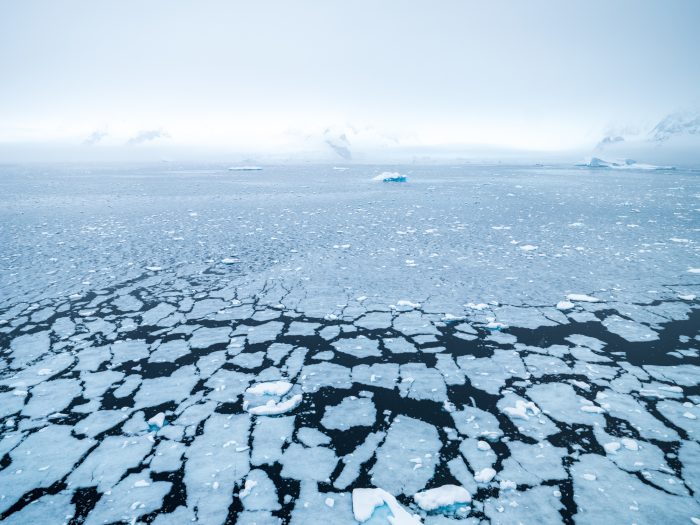Written by Laure Poncet
Last week, Dr. Amelie Meyer and Dr. Adele Morrison provided evidence to the Committee regarding the importance of Antarctica to Australia’s weather and climate, emphasising the need to maintain and continue research in this vital area.
This appearance followed a joint submission by the ARC Centre of Excellence for Climate Extremes and the ARC Centre of Excellence for 21st Century Weather to the “Inquiry into the importance of Antarctica to Australia’s national interests”.
The submission aims to inform on the most recent developments in Antarctic research and offers five main recommendations for the committee to consider, including:
- Maintain Australia’s role as a world class research leader in Antarctica
- Better support research on Antarctic sea ice
- Ensure Australia’s climate modelling capability is maintained through long-term government support
Representing both Centres at the public hearing, Dr. Amelie Meyer, Chief Investigator at the ARC Centre of Excellence for Climate Extremes and Senior Research Fellow at the University of Tasmania in Hobart, said:
“Over the past eight years, we’ve seen a sudden and alarming decline in sea ice around Antarctica.”
“We’ve seen record low coverage nearly every year, with 2023 having the biggest anomaly. This year, the sea ice is actually very close to last year’s record low.”

Dr. Meyer explained that the current conditions in Antarctica are concerning, with alarming rates of decline in sea ice pointing to a possible regime shift, and potentially indicating a tipping point element – a threshold beyond which a change in the climate system becomes self-sustaining.
“The entire research community is really concerned with this unforeseen, sudden change, and it is working on understanding why, and what is coming ahead,” she said.
“Declining sea ice and other key parts of the Antarctic climate system are not important just for Antarctica. They shape Australia’s weather and climate and coastlines. From rainfall, droughts, to sea level rise, they can impact our food chain, our farmers, our health and our economy,” she added.
Given these implications, Dr. Meyer highlighted the need to better observe and predict sea ice changes over the decades to come.
However, she also noted that Australia had “missed the boat” on that point, highlighting the lack of scientific voyages dedicated to sea ice and the logistical challenges to access Antarctica with the RSV Nuyina, Australia’s Antarctic icebreaker and research vessel.
“The committee will be aware that Australia has had logistical challenges over recent years when it comes to accessing Antarctic waters for research,” she said.
“The new Australian icebreaker, Nuyina, was delayed in its building, delivery and commissioning. As a result, the first sea-ice-dedicated science voyage for Australia in over 10 years was cancelled in 2022 and has not been rescheduled.”
Dr. Meyer also explained that, although the Nuyina is currently operational, it serves a dual purpose of providing a platform for scientific research as well as resupplying Australia’s Antarctic bases, leaving only 60 days per year dedicated to research.
“At the moment, we get 60 days a year but that includes time to get there. So it’s not 60 days of just science, and 60 days is a very small amount of the whole year,” she said.
“Previous colleagues have mentioned the idea of two ships, and that’s what many countries do. They do not refuel the stations with their main icebreaker. It’s not really my area of expertise but the way it is right now is not working in terms of collecting the data we need for science.”
In addition to increased support for research around sea ice and more days in the field, maintaining Australia’s modelling capacity was highlighted as crucial to sustaining Australia’s leadership in Antarctic research.
Dr. Morrison, Associate Investigator at the ARC Centre of Excellence for Climate Extremes, explained that models are essential for projections of sea level rise and weather and called for long-term government support for scientific model development.
“The models are essential for the projections. If we want to understand how Australia’s weather will change in the future and how changes in sea ice or changes in Antarctica will impact Australia’s weather, we really need to maintain that support that we have now for Australia’s climate models,” she said.
Following last week’s public hearing, the Committee will continue to gather evidence on the topic and produce their recommendations in due course in the form of a report.
A recording of the hearing is available here.
Read the submission and the five key recommendations here. The submission was written by Dr Danille Udy, Professor Julie Arblaster, Professor Nerilie Abram, Professor Andy Pitman, Professor Christian Jakob, Dr Amelie Meyer, Alice Wilson and led by CLEX’s lead knowledge broker Angela Kaplish.
